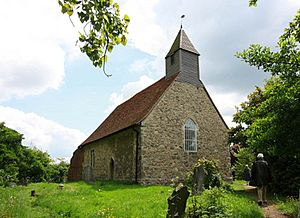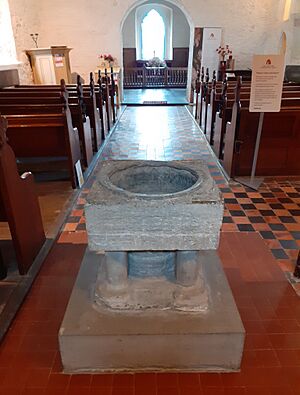All Saints Church, Vange facts for kids
Quick facts for kids All Saints Church, Vange |
|
|---|---|

All Saints Church, Vange
|
|
| Lua error in Module:Location_map at line 420: attempt to index field 'wikibase' (a nil value). | |
| OS grid reference | TQ 715 867 |
| Location | Vange, Basildon, Essex |
| Country | England |
| Denomination | Anglican |
| Website | Churches Conservation Trust |
| Architecture | |
| Functional status | Redundant |
| Heritage designation | Grade II* |
| Specifications | |
| Materials | Ragstone and flint Tiled roof. |
All Saints Church is an old Anglican church located in Vange, which is now part of Basildon, Essex, England. It's a special building because it's listed as a Grade II* historic building, meaning it's very important. The Churches Conservation Trust helps take care of it. You can find the church just south of Basildon, near the A13 road.
Contents
History of All Saints Church
All Saints Church in Vange is thought to have been built around 1328. This makes it the oldest church still standing in Basildon. Over the years, new parts were added to the church.
Changes Over the Centuries
The church saw its last big change in 1837. At that time, the west wall was rebuilt, and a special viewing area called a gallery was added. Later, in the late 1890s, the church was restored again. This work finished in May 1896. In 1890, the old box pews, which were like private seating areas, were replaced with benches.
At first, oil lamps lit the inside of the church. Then, in 1931, electricity was installed. This brought both light and heating to the building.
Becoming a Listed Building
On July 4, 1955, All Saints Church became a listed building. This means it was recognized as a building of historical importance by the government. Today, it is known as a Grade II* listed building. This shows how special and important its history is.
New Church and Redundancy
In the 1950s, more people started moving to Vange. This happened as new homes were built for the Basildon new town. The old church was considered too small and not in the best condition for the growing population. So, a new church called St. Chad's was built. It opened in 1958.
Even after the new church opened, some services, weddings, and funerals still took place at All Saints. However, by the 1990s, it was clear that the church needed major repairs to survive. The last service was held in 1994. All Saints Church in Vange was officially closed on February 14, 1996. It was then handed over to the Churches Conservation Trust in January 2003.
Restoration Work
Repairs were needed because the church building had become old and damaged. Sadly, it had also been vandalized. The repair work happened in two stages. The first stage began in April 2004. During this time, the building was made stable and protected from the weather.
The second stage involved fixing the inside of the church. This included repairing doors and windows and fixing cracks in the walls. Workers also rebuilt the stairs to the rood loft. They carefully preserved old wall paintings and repaired the ceiling in the nave. The ceiling in the chancel was removed, and the bellcote was restored.
Architecture of the Church
The church is built using ragstone and flint, which are types of stone. It has a roof made of tiles. The church has a simple design, with just a main hall called a nave and a special area for the altar called a chancel. There is also a small tower for bells, called a bellcote, at the west end.
The bellcote is made of wood. It has weatherboarding on the sides and a pointed roof covered with shingles. On the south wall of the nave, you can still see parts of a very old Norman window. There is also a door from the 15th century. Both the north and south walls of the nave have windows that also date back to the 15th century.
The font, which is used for baptisms, is from the 12th century. It has a square bowl supported by five columns. One side of the font is decorated with a zigzag pattern. Inside the chancel, there are wall memorials from the 17th century.
Special Church Features
All Saints Church has several interesting features that show its long history.
Norman Chancel Arch
When you enter the chancel, you will see the original Chancel Arch. This arch is about 900 years old! It has been repaired many times over the centuries, with each generation adding their own touch. The arch is about 3.75 feet (1.1 meters) thick. Repairs were done above it in the 13th and 14th centuries.
12th Century Font
In the nave, there is a beautiful font from the 12th century. It is made of a type of stone called Purbeck Marble. The bowl of the font is lined with lead. Inside, you can see graffiti from the 17th century. This graffiti has a zigzag pattern, and on the outside, it has V-shaped patterns.
Rood Stairs
The nave also has a set of stone stairs called the rood stairs. These stairs were recently repaired. They would have led up to a screen on an upper level. There might have even been a floor on the oak beams, creating a loft space. The rood screen itself was removed during the Reformation.
Medieval Last Judgement Painting
In the chancel, on the south wall, you can see a small part of a medieval painting. This painting is from the 13th century. It was discovered during repairs in 1904. The painting shows a scene from the Doom or the Last Judgement, which comes from the Book of Revelation. Most of this painting was destroyed around 1540.
Memorials
On the North wall of the chancel, there are three special plaques. Two of these plaques are from the 17th century, and one is from the early 19th century. These plaques remember people from the past.
Churchyard Features
The churchyard outside has the war graves of seven service members. These include five soldiers and two sailors from the Royal Navy who died during World War II.
See also
 | Sharif Bey |
 | Hale Woodruff |
 | Richmond Barthé |
 | Purvis Young |


